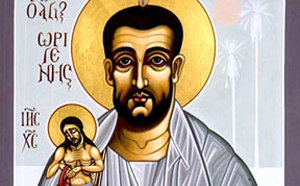Origen (184-253) was a scholar and early Christian theologian who was born and spent the first half of his career in Alexandria. He was a prolific writer in multiple branches of theology, including textual criticism, biblical exegesis and hermeneutics, philosophical theology, preaching, and spirituality.
“when the Son is said to be subjected to the Father the perfect restoration of the entire creation is announced, so when his enemies are said to be subjected to the Son of God we are to understand this to involve the salvation of those subjected and the restoration of those that have been lost.” (De Princ. III 5.7)
“So then, when the end has been restored to the beginning, and the termination of things compared with their commencement, that condition of things will be re-established in which rational nature was placed, when it had no need to eat of the tree of the knowledge of good and evil; so that when all feeling of wickedness has been removed, and the individual has been purified and cleansed, He who alone is the one good God becomes to him “all,” and that not in the case of a few individuals, or of a considerable number, but He Himself is “all in all.” And when death shall no longer anywhere exist, nor the sting of death, nor any evil at all, then verily God will be “all in all” ” (De Prinicipiis, 3.6.3).
“Stronger than all the evils in the soul is the Word, and the healing power that dwells in him, and this healing He applies, according to the will of God, to everyman. The consummation of all things is the destruction of evil…to quote Zephaniah: “My determination to gather the nations, that I am assemble the kings, to pour upon them mine indignation, even say all my fierce anger, for all the earth shall be devoured with the fire of my jealousy. For then will I turn to the people a pure language that they may all call upon the name of the Lord, to serve Him with one consent”…Consider carefully the promise, that all shall call upon the Name of the Lord, and serve him with one consent.”
“This is why the Word of God necessarily presents, first, the eradication, complete destruction, and elimination, and only after this the edification and new planting. In Scripture we always find cited first the somber aspects, so to say, and then, cited afterwards, those which appear joyful. “I shall kill and then give life.” God does not say, “I shall give life” and then “I shall kill,” because it is impossible that what God has made live be eliminated by God himself or anyone else. Who is the one whom “I shall kill”? It is Paul the informer, Paul the persecutor, and then “I shall make him live,” that he may become Paul the apostle of Jesus Christ […] Thus, God necessarily begins with bitter words such as “I shall kill,” and then, after killing, he says: “I shall give life”; “I shall strike and then heal.” The Lord chastises to instruct those whom he loves […] First he has a person suffer, then he restores her again.” (Hom. in Ier. 1,15-16)
“Jesus is the propitiator not only of believers and the faithful but also of the whole world. For although the entire creation is awaiting the grace of the redeemer, nevertheless each one shall come to salvation in its own order.” (In Rom. III,8,13)
